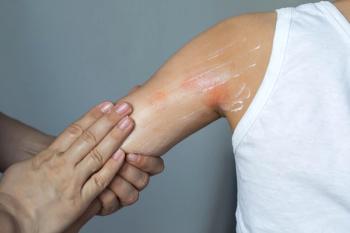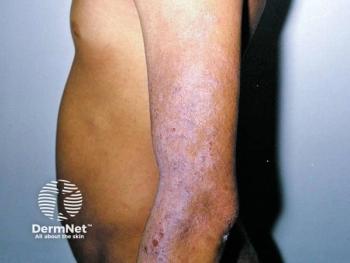
Researchers: Swimming affects skin's hydration
National report — Recreational swimming in swimming pools results in short-term but significant changes to biophysical properties related to skin hydration, researchers report.
National report - Recreational swimming in swimming pools results in short-term but significant changes to biophysical properties related to skin hydration, researchers report.
Changes after swimming in a pool are evident at four hours, but skin parameters return to normal levels within 24 hours, according to research presented at the meeting of the International Society for Bioengineering and the Skin in Orlando, Fla.
Lead author Sophie Dheurle-Gardinier, Pharm.D., conducts research at CE.R.I.E.S., a skin research center in Neuilly sur Seine, France. She says that the causes of the itching and skin dryness that many people complain about after swimming are not well-documented in the literature.
Study details In the four-day study, researchers measured biophysical skin parameters before women swam for one hour in a public pool. Researchers instructed the women to shower after swimming, with water only (no soaps or cleansers). Then, they measured participant's biophysical skin parameters at four, 24, 48 and 72 hours after swimming. The researchers looked at the parameters of transepidermal water loss, skin temperature, sebum casual level, capacitance and skin pH.
"We found significant changes of some of these biophysical skin parameters occurred four hours after swimming," Dr. Dheurle-Gardinier says. "We found that there was a decrease of skin capacitance, which is a parameter related to skin hydration. So, there was a significant decrease in skin hydration four hours after swimming."
Researchers measured the parameters on facial sites and on the upper chest, forearm and leg.
Capacitance, or hydration, decreased at all the sites at four hours after swimming, with the highest decrease of about 20 percent on the upper chest. Hydration measured on the forearms of participants decreased about 20 percent, and on the cheek, about 13 percent.
Biophysical skin hydration returned to the basal values within 24 hours after swimming, according to the study.
Skin sebum decreased four hours after swimming on the forehead and upper chest. The highest decrease of the skin sebum was about 76 percent, found on the upper chest. Researchers found a 33 percent decrease on the forehead.
Changes in pH "We also found an important change with skin pH," Dr. Dheurle-Gardinier says. "We found that four hours after swimming, pH increased on the cheek, upper chest, forearm and leg. The highest increase was on the upper chest - an increase of 24 percent for skin pH. It represents an increase of around one pH unit. Skin pH value is around 5.6, and four hours after swimming it was around 6.5."
These other changes also resolved after 24 hours, according to the study.
Frederique Morizot, M.D., a study author and head of clinical research at CE.R.I.E.S., says the skin parameters used in the study are related to hydration, so they affect the quality of stratum corneum.
"It is clear that the skin has the ability to repair and adapt itself to the variations of the environment. This was demonstrated by the fact that biophysical parameters went back to basal values within 24 hours," Dr. Morizot says. "However, to be able to provide these repair mechanisms, we know that the skin has to produce proteins and lipids, which are the main constituents of the stratum corneum. It is clear that any product which allows the skin to produce these substances will help it to adapt to modifications of the environment."
Disclosure: The authors of this paper are employed by CE.R.I.E.S., a research center on healthy human skin founded by Chanel.
Newsletter
Like what you’re reading? Subscribe to Dermatology Times for weekly updates on therapies, innovations, and real-world practice tips.












